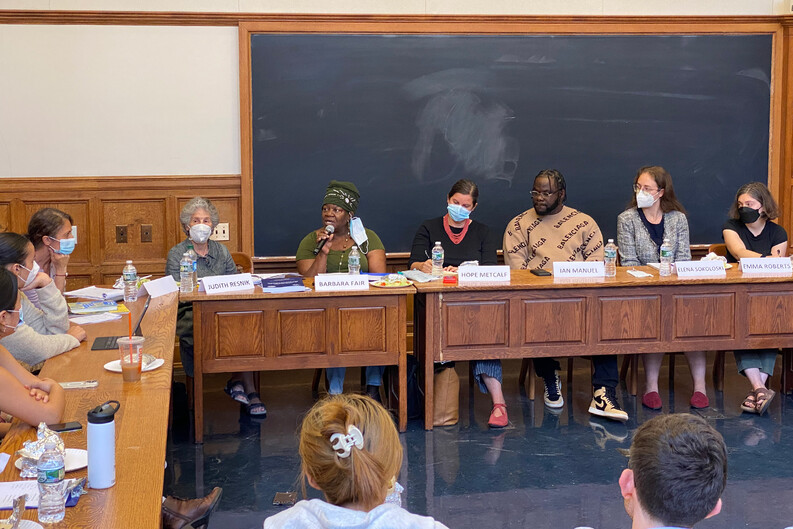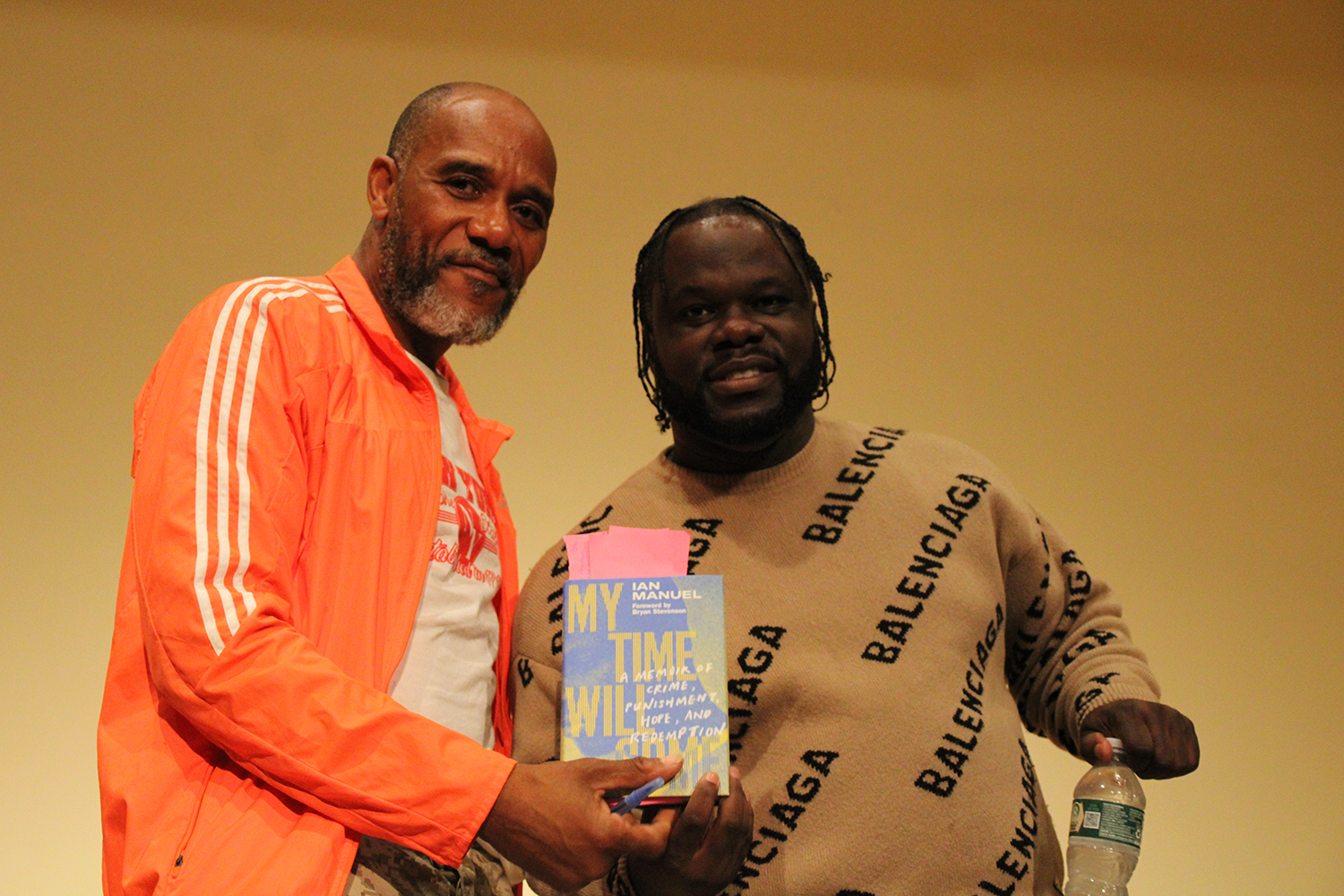Event Joins Activists, Students, and Survivors to End Solitary Confinement

A roundtable discussion at Yale Law School in September invited community activists, survivors of solitary confinement, and others to examine what has and has not changed in the fight to abolish solitary confinement. The event, Seeing and Stopping Solitary, was organized by the Arthur Liman Center for Public Interest Law, joined by the Law and Racial Justice Center, and the Orville H. Schell, Jr. Center for International Human Rights. Arthur Liman Professor of Law Judith Resnik, the Liman Center’s Founding Director, moderated.
Solitary confinement, which puts incarcerated people into isolation in small spaces and at times for years and decades, is pervasive. Tens of thousands of people are held in solitary confinement in the U.S., as documented by a series of reports by the Liman Center and the Correctional Leaders Association from 2013 to 2022. Based on self-reporting surveys of prison administrators, the “Time-In-Cell” series has documented the number of people in isolation, their demographics, and how long they were confined. Another resource, Unlock the Box’s 2023 report, Calculation Torture, used other data sources to document more than 122,000 people in solitary confinement in U.S. jails or prisons.
LEARN MORE: Seeing Solitary website by the Liman Center
At the recent Law School discussion, attendees heard from people close to the issue. Panelists included Barbara Fair, who has worked with colleagues at Stop Solitary CT since 2015 to end isolation in Connecticut’s jails, prisons, and youth detention facilities. Fair has witnessed the harms of solitary confinement firsthand through the experiences of her son. He was held in solitary confinement at Northern Correctional Institution while in the custody of the Connecticut Department of Correction at age 17.
“It brings up so much pain because at 40 years old, he still suffers from what happened to him,” Fair told the group. “My son is among those people who were irreparably harmed.”
Connecticut Legislation Responds to People in Prison System
Fair has channeled her experiences to lead a coalition that was pivotal in drafting and securing passage of key legislation in Connecticut, the PROTECT Act. Signed by Gov. Ned Lamont in 2022, PROTECT limits solitary confinement to a maximum of 15 consecutive days and 30 total days within any 60-day period. The law also creates an independent ombudsperson to investigate complaints against the Connecticut Department of Correction and establishes a nine-member advisory committee to help implement the law.
Fair aims to build on that work to bring isolation to an end.
“What goes on behind bars in Connecticut and across this nation is shameful,” Fair said. “It should be criminal. If we were caging dogs and cats like we're caging human beings, there are laws to protect them. There are no laws to protect us. I say ‘us’ because most of the people in those cages suffering from the isolation and the psychological harm are Black and brown people.”
Hope Metcalf ’01, Executive Director of the Schell Center, led students in the Lowenstein International Human Rights Clinic to collaborate with Stop Solitary CT to support the PROTECT Act. The Liman Center also submitted testimony in support of the act at hearings held in 2021 and 2022.
Metcalf credited Fair and her colleagues with enabling the group drafting the statute to respond to the priorities of incarcerated individuals.
“One of the big learnings that they gave us was that time out of cell does matter,” Metcalf said. “It is a material improvement in their lives. Also, they said that we should know that our work would not have meaning unless there was accountability, transparency, and representation for the voices of people in the prison system.”
Noting the frequent political obstacles facing efforts to reform prison conditions, commentator and Liman student director Emma Roberts ’25, asked how the campaign to pass the PROTECT Act responded to claims that limiting solitary confinement was a risk to prison safety and security.
“Whose safety and security are we talking about?” Fair asked, noting that community safety and public health should also be policy considerations. “Because after you put these people in these conditions, they're coming back to the communities that are already suffering in Connecticut. How safe are we after you've tortured someone and they come back home?”

Panelist Offers a Firsthand Account
The roundtable also featured Ian Manuel, an advocate, author, and poet, who was sentenced to life imprisonment without the possibility of parole following arrest at age 13. Eighteen of the 26 years he was held in the Florida prison system were spent in solitary confinement. Manuel wrote poetry during his incarceration and continued to write and create after the Alabama-based Equal Justice Initiative won his release in 2016. Manuel’s memoir, My Time Will Come: A Memoir of Crime, Punishment, Hope, and Redemption, was published in 2021.
“I get asked all the time, ‘How did I survive in solitary and come out with my sanity, my humanity still intact?’” said Manuel. “I like to tell people I dived into the depths of my imagination. By being so young, I still had a child-like mind. I would get lost in my imagination.”
During his remarks, Manuel recited “Genie In A Bottle”, the first poem he wrote in solitary confinement after reading Tupac Shakur’s book, The Rose That Grew from Concrete.
Manuel also described the inhumanity he experienced.
“It's bad enough to put you in solitary confinement and just leave you there for such an extended period but they also torture, beat, and gas you,” he said. “I've been gassed before with chemical agents for being caught talking. You're not allowed to talk in solitary. They want it to be very quiet in there.”
Since his release, Manuel has tried to lessen the use of isolation use in the Florida Department of Corrections.
“They know they can’t just tell me anything because I was there and I know what is supposed to happen and what’s not supposed to happen,” he said.
Manuel now travels throughout and beyond the United States, sharing his story and fighting for an end to abusive prison conditions.
Panelists Respond to Proposed Federal Legislation
Senior Liman Fellow in Residence Pardiss Kebriaei has worked on issues of civil and human rights for more than 20 years and represented people held at Guantánamo Bay. She asked the speakers’ views of the End Solitary Confinement Act, which U.S. Rep. Cori Bush introduced in July. The law would prohibit federal facilities from confining individuals in a cell for more than four hours per day, establish minimum standards for incarceration, require more procedural protections for in-prison punishment, and incentivize states and municipalities to follow suit.
“It's fantastic to see this issue on the national level,” Metcalf said of the bill. “Of course, it's only going to be a starting point. It's not going to be what we end up with. I would love to think more about the precedents for what leads to extreme practices. Why is it happening? That's where understanding solitary as a continuum of dehumanization is really important.”
Solitary Confinement’s Lasting Effects
Law students and others in attendance were invited to pose questions to the speakers. One asked how Manuel has dealt with the trauma of his experience since being released from prison.
“It's little moments like when Barbara was talking and I remember some of the sadistic things I went through,” Manuel said. “I'm not going to say retraumatized, but it bubbles up now and then. My mom told me something that I still carry with me to this day. She said, ‘Ian, you're brilliant. No matter what, never let them take your mind.’ It was me remembering that my mind is my last line of defense against the insanity that surrounds me.”
Fair’s remarks at the close of the session were personal.
“Listening to you is like listening to my son,” Fair said to Manuel. “For example, this morning he sent me a text that said, ‘Mom, I love you. I'm strong because of you.’ Ian, my heart goes out to you, and to so many others who have been through this experience because I know what it does. It breeds mental illness, addiction, and all kinds of problems. I no longer talk about reform. We have to transform it, which means we have to dismantle this whole system from the roots that started in slavery. People that come out of incarceration, they may survive, but we need to make sure that they heal.”
In a related event, Manuel discussed his life and his memoir in an evening conversation at Yale University with Clyde Meikle, a TRUE Leadership Associate with the Vera Institute and a Fellow with the Yale Law School’s Access to Law School Program. The event was organized by The Law and Racial Justice Center and cosponsored by the Liman Center, the Yale Prison Education Initiative, and the Full Citizens Coalition.
For more information about solitary confinement, visit the Liman Center’s website, Seeing Solitary.


